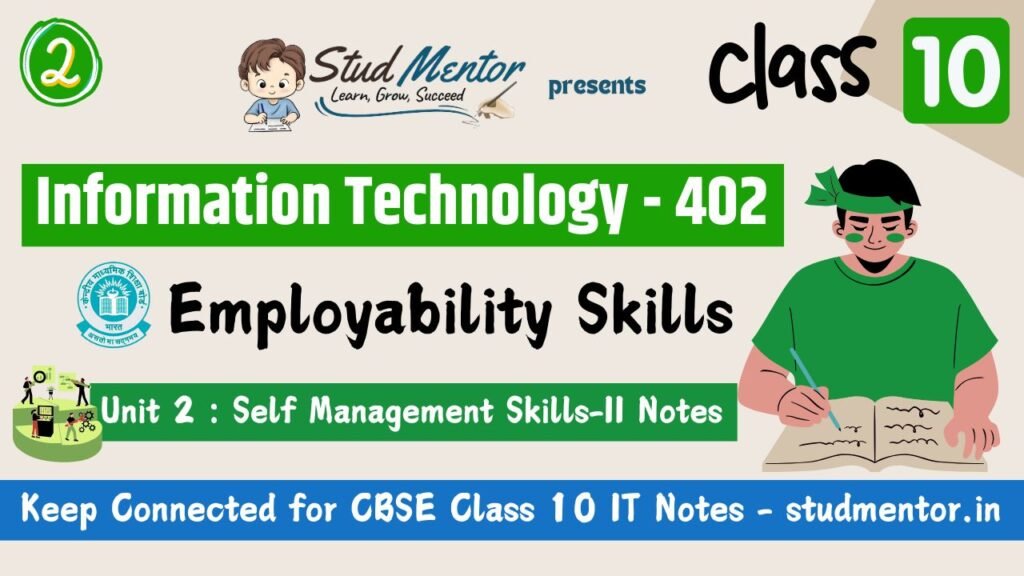In this article we providing information regarding latest CBSE Class 10 IT (Information Technology) – Unit 2 Self Management Skills Notes 2024
CBSE Class 10 IT – Unit 2 Self Management Skills Notes 2024
We are giving Complete Notes and Important Points for Class 10 IT (402) – Unit 2 Self Management Skills 2024-25.
Self-Management Skill
Self-Management, also referred to as ‘Self-Control’, is the ability to control one’s emotions, thoughts and behavior effectively in different situations.
Some of the skills you must master to succeed in life :
Self-awareness :
- Ask for honest feedback. Think about your daily interactions and how you handled situations well or could have handled them differently.
Responsibility :
- Taking responsibility for your tasks is very important.
- For Example, If you have been assigned a task by a teacher; ensure you take complete ownership. Even if you are unable to complete the task on time, you must report it and then correct it.
Time Management :
- Prioritize the things you have to do.
- Remove waste and redundancy from work.
- Make a time table and follow it diligently.
Adaptability :
- Stay current with best practices and read up on new information always.
- Prepare yourself for new changes, so that you can transition seamlessly.
Stress Management
What is Stress ?
- Stress can be defined as our emotional, mental, physical and social reaction to any perceived demands or threats.
- Stressors are the reason for stress.
- Stress is a part of everyday life. There are many instances when stress can be helpful.
- The stress created by assignment deadline can motivate you to finish the assignment on time. But when experienced in excess or for a long period of time, stress can harm our emotional and physical health,
- The ultimate goal is to strike a balance between life, work, relationships, relaxation and fun.
ABC of stress management
- A – Adversity or the stressful event
- B – Beliefs or the way you respond to the event
- C – Consequences or actions and outcomes of the event.
Benefits of Stress Management
Stress management can help you to :
- Have a joyful life.
- Focus and complete tasks on time.
- Be a happy person as you are stress free.
- Be more energetic and spend quality time with your friends and family.
Three Steps to Manage Stress
- Step 1 – Be aware that you are stressed. (Signs of Stress such as Headache)
- Step 2 – Identify what is causing you stress. (Find the Reason for stress)
- Step 3 – Apply stress management methods (Take time to relax)
Management Techniques
- Time Management
- Physical exercise and fresh air
- Healthy diet
- Positivity
- Organizing academic life, no delaying
- Sleep (7-8 Hours)
- Holidays with family and friends
Ability to Work Independently
If you can become a calm and relaxed person, you will be have the ability to work independently, which means.
- Becoming self-aware, self-monitoring and self-correcting.
- Knowing what you need to do.
- Taking the initiative rather than being told what to do.
- Recognizing your mistakes and not blaming others.
- Having the ability and they will to lean continuously.
Emotional Intelligence
Emotional Intelligence is the ability to identify and manage one’s own emotions, as well as the emotions of others. It is generally said to include at least three skills :
- Emotional Awareness : The ability to identify & name one’s own emotions.
- Harnessing emotions : The ability to harness & apply emotions to tasks like thinking & problem solving.
- Managing emotions : The ability to regulate one’s own emotions when necessary & help others to do the same.
Some steps to manage emotional intelligence are :
- Understand your emotions
- Rationalize
- Practice
Self – Awareness Strength & Weakness Analysis
Being self-aware means that you can identify your strengths & weaknesses. Self-awareness, therefore, will help you in converting your weakness into strength & strength into an exceptional talent.
- Knowing yourself
Techniques for Identifying strengths & weaknesses
- Finding Strength – Think of anything that you are always successful at.
- Finding Weaknesses – Point out the things you find difficult to do.
Difference Between Interests and Abilities
- Interests – Things that you like to do in your free time that make you happy. Things you want to learn or would like to do in the future.
- Abilities – An acquired or natural capacity. Enable you to perform a particular job or task with considerable proficiency.
Self – Motivation
- Self- Motivation is simply the force within you that drives you to do things.
- Self- Motivation is what pushes us to achieve our goals, feel happy and improve our quality of life.
- In other words, it is our ability to do the things that need to be done without someone or something influencing us.
Types of Motivation
- Internal Motivation – We do things because they make us happy healthy & feel good. Such as dancing, singing etc.
- External Motivation – We do things because they give us respect, recognition & appreciation. Ex. Vedant participate in a 100m race and won a prize. This Motivated him to go for practice every morning.
Qualities of Self Motivated People
- Know what they want from life
- Are Focussed
- Know what is important
- Are dedicated to fulfill their dreams
How to Build Self Motivation
- Find out your strength
- Set and focus on your goals.
- Develop a plant to achieve your goals.
- Stay loyal to your goals.
Self Regulation and Goal Setting
Goals are set of dreams with a deadline to get them. Ex. I want to complete my class 10th syllabus till mid-Jan.
Goal Setting is all about finding and listing your goals and then planning on how to achieve them.
How to Set Goals ?
We ca use SMART method to set goals.
SMART stands for
- Specific – Goals should be well – defined and clear. They should answer the “What”, and “How” questions.
- Measurable – Goals should have criteria or indicators that allow you to track progress and determine when the goal is achieved.
- Achievable – Breaking down big goals into smaller parts will make the goal achievable.
- Realistic – Goals should be realistic and attainable. Ensure that your goals are challenging but within reach.
- Time bound – A SMART goal should have a timeframe by when the goal needs to be achieved.
Time Management
Time management is the thinking skill that helps you to complete tasks on time. Make a good guess at how long it will take you to do something. Make a daily timetable. Submit homework and assignment on time. Not waste time during the day.
Four Steps for Effective Time Management
- Organize
- Prioritize
- Control
- Track
Thanks to Beloved Readers.



